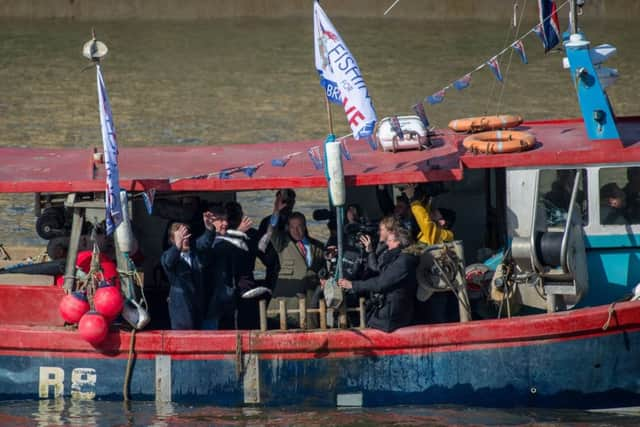How the Brexit fishing row affects Scotland - and why it matters
Nigel Farage was in attendance, as is his wont, but perhaps more significant was the presence of Scottish Tory politician Ross Thomson.
The Aberdeen South MP might have dropped anchor and headed back to shore before the haddock-dumping began in earnest, but he had certainly proved his point.


Advertisement
Hide AdAdvertisement
Hide AdWith prominent Conservatives such as Jacob Rees-Mogg joining the protest, it was clear the potential impact on Theresa May’s Government.
In Scotland, concerns over fishing are even more pronounced.
We look at why the row has taken on increased importance, and what it could mean for Scotland’s fishing industry, and politics.
Why it has taken hold


There could be any number of reasons why the row has taken hold at Westminster.
Chief among them is the simple fact that for many Leave voters and campaigners, the campaign message of ‘taking back control’ was a powerful one. When it emerged that the UK would be subject to the Common Fisheries Policy even after the country left the EU, the anger of many Brexiteers was swift, and palpable.
As an island nation, there is also clearly an emotional pull in backing the fishing industry.
That could help explain not only the prominence of the row in the media, but also why it remains such a bug bear to prominent Leave backers.
For the negotiators involved in Brexit, it must have been galling to see their discussions portrayed as a failure over a relatively small part of the agreement.
Advertisement
Hide AdAdvertisement
Hide AdIt has been estimated since that less than a half of one per cent of the UK’s economy pertains to the fishing industry.
Perhaps it is those statistics that led the Government, which has been slow to respond to the row, to understate the still powerful pull of fishing for many politicians.
Scotland’s Catch
In Scotland, however, the economic impact of the fishing industry, while not gargantuan, are much more significant.
60 per cent of the UK’s total fish catch is caught at Scottish ports, according to a study by Edinburgh University.
The value of that catch was, in 2017, estimated to be worth around £500m to the Scottish economy.
For politicians, the fishing industry represents not only an important source of local pride in their area, and a key employer, but a sense of community.
Were fishing to cease overnight, countless towns, villages, and other coastal communities would be decimated.
The Political angle
In Scotland, as a number of unemployed former SNP MPs could tell you, fishing communities were more inclined to back Brexit.
Advertisement
Hide AdAdvertisement
Hide AdThe most pro-Brexit constituency in Scotland, which voted as a country to remain in the EU, is estimated to be Banff and Buchan.
That constituency offered a stark example of how powerful a perceived lack of support for fishing communities, as a 20 per cent swing to the Conservatives in the 2017 election saw the SNP’s Eilidh Whiteford lose out to David Duguid of the Tories.
There is, however, political danger for all parties on fishing.
The Conservatives are being accused of selling communities down the river if they back the transition deal which retains the Common Fisheries Policy.
For their part, the Tories accuse the SNP of wanting to remain in the EU as in independent country, and, by extension, the same Common Fisheries Policy which has caused so much consternation for fishing communities in Scotland.
As early as 2012, Nicola Sturgeon’s party were talking up the potential influence that an independent Scotland could have on the CFP.
Whether independence, Brexit, or even trade, fishing casts an outsize shadow on politics relative to its economic impact.
As a potential political minefield, this current row could yet rumble on and on.
